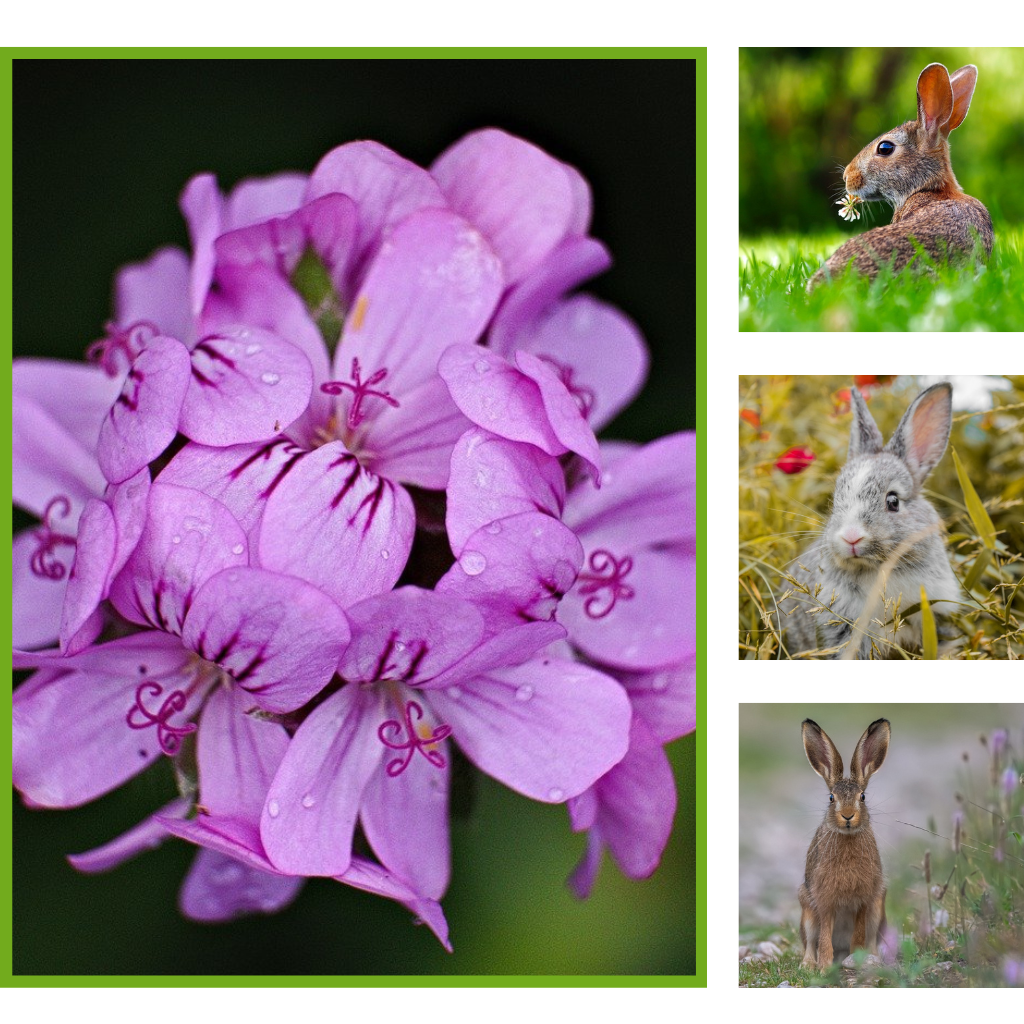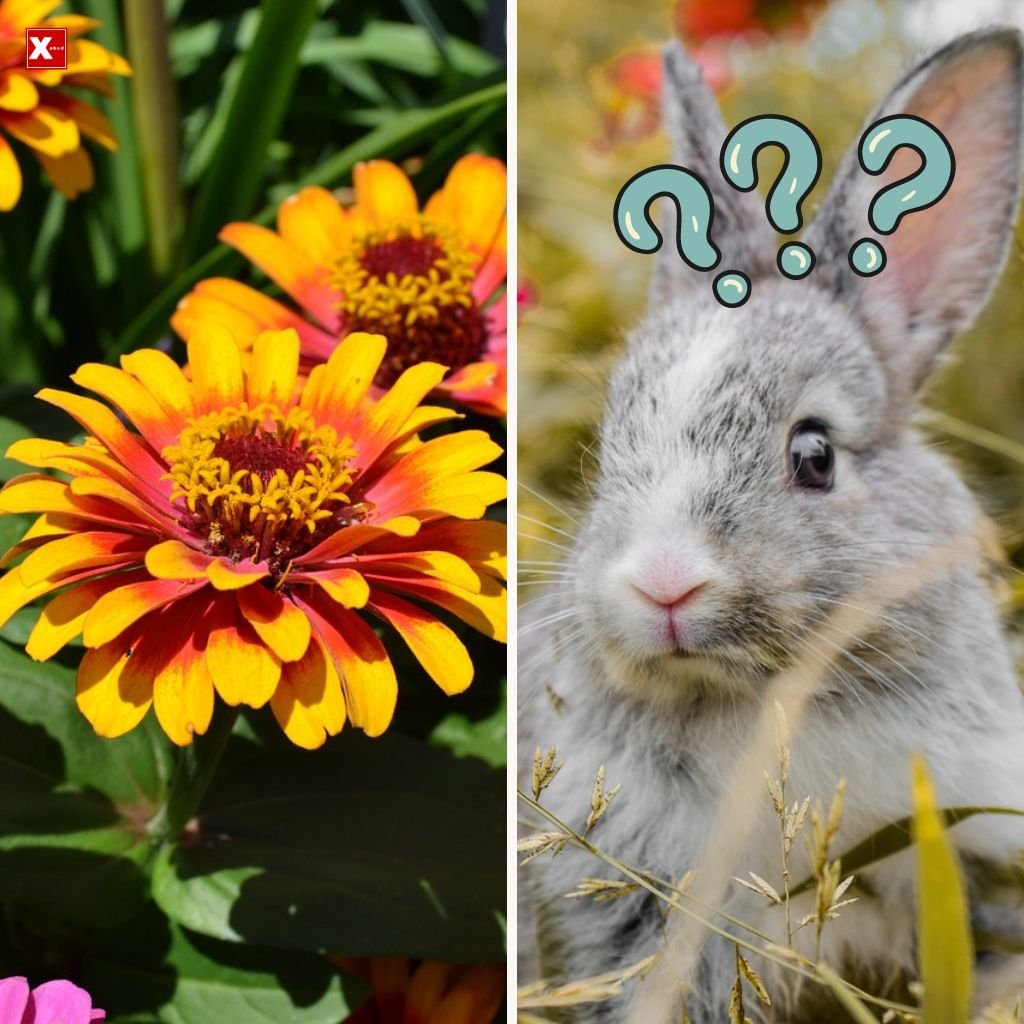Yes, rabbits sometimes eat geraniums. But geraniums are not a primary food choice for rabbits. Let’s look at rabbits eating geraniums from different angles.
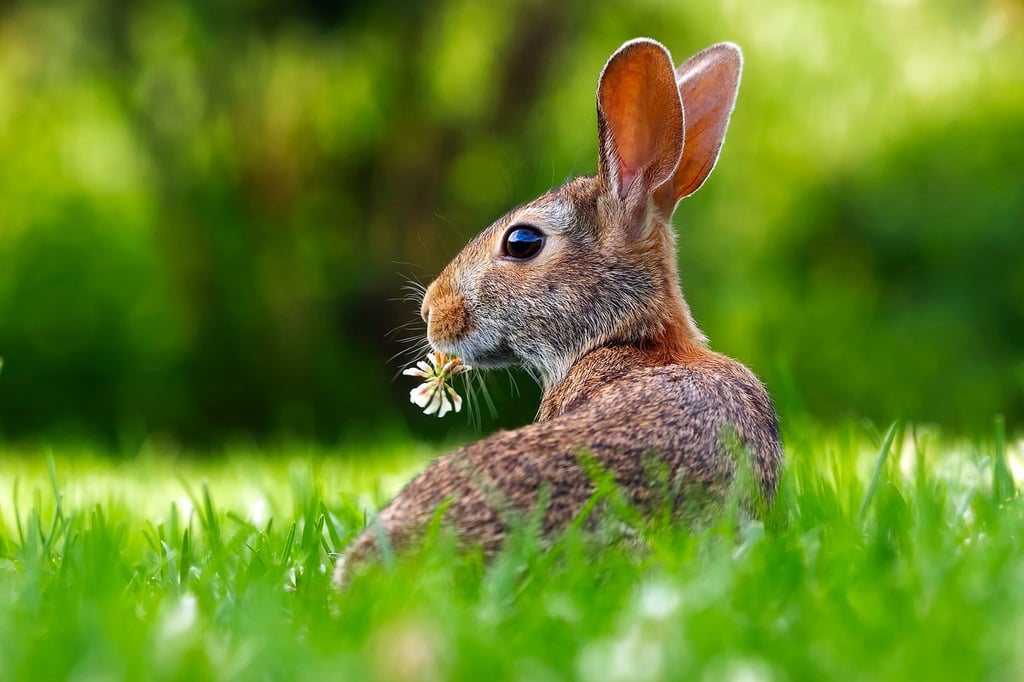
Understanding the Rabbit Diet
Before we delve into whether rabbits eat geraniums or not, it is important to have a basic understanding of the rabbit diet. Rabbits are herbivores, which means their diet consists solely of plant-based materials. In the wild, they primarily feed on grasses, weeds, and a variety of leaves, flowers, and vegetables. Their digestive system is designed to process a high-fiber diet, and they have a unique mechanism called hindgut fermentation to extract nutrients from tough plant material.
Rabbits have a diverse palate and can consume a wide range of plant species. However, their preferences may vary based on factors such as availability, environmental conditions, and individual tastes. While they are generally attracted to tender and succulent vegetation, not all plants are equally appealing to them.
When it comes to geraniums, it is important to understand that they belong to a group of plants known as Pelargonium. Unlike true geraniums (genus Geranium), Pelargonium plants are not known to be highly palatable to rabbits. Although rabbits may occasionally nibble on geranium foliage, it is not their primary choice of food.
Instead, rabbits are more likely to target plants such as clover, dandelions, grasses, and various leafy greens that offer them higher nutritional value. These plants are typically tender and have a higher moisture content, making them more enticing and easier for rabbits to consume.
- Grasses
- Weeds
- Leaves
- Flowers
- Vegetables
As herbivores, rabbits have evolved to efficiently extract and utilize nutrients from plant material. Their diet provides them with essential vitamins, minerals, and fiber necessary for their overall health and wellbeing. By understanding their natural dietary preferences, we can better comprehend why rabbits may or may not eat geraniums.
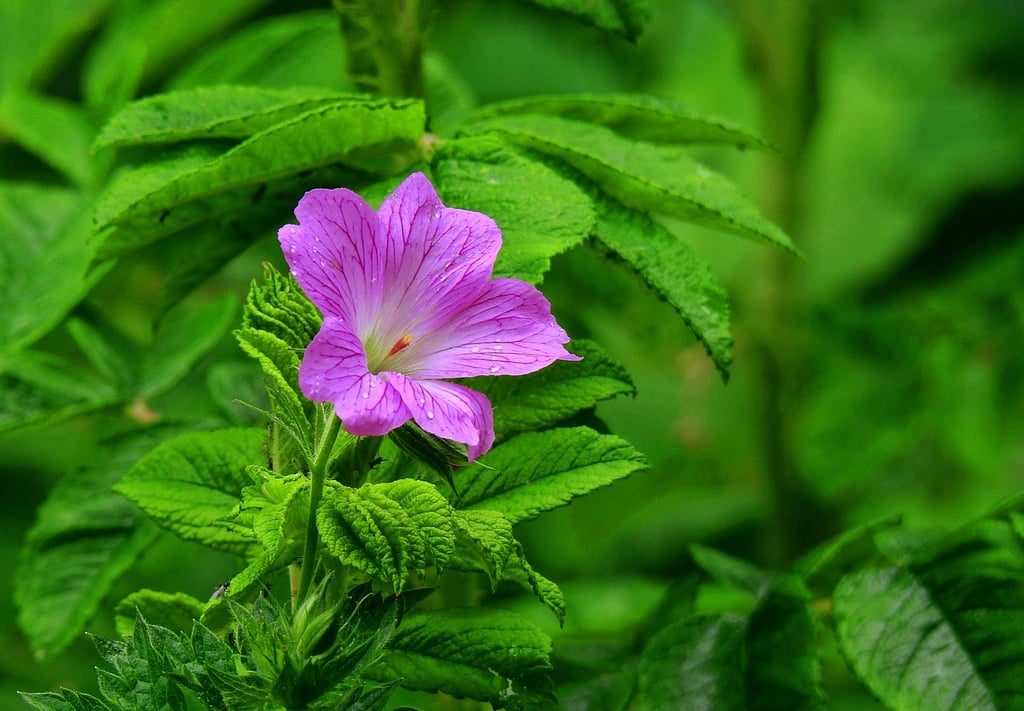
The Allure of Geraniums for Rabbits
Geraniums, with their vibrant and fragrant flowers, are a popular choice for many gardeners. These colorful plants not only add beauty to gardens but also attract the attention of rabbits. So, why are geraniums so alluring to these furry creatures?
One reason is the enticing aroma emitted by geraniums. Rabbits have a keen sense of smell, and the scent of geraniums can be irresistible to them. The fragrant oils and compounds found in geraniums can act as a natural attractant, drawing rabbits closer to these plants.
In addition to their fragrance, geraniums offer rabbits a delectable treat. The leaves and flowers of geraniums are tender and tasty, making them an appealing snack for these herbivorous animals. The succulent foliage provides rabbits with essential nutrients and hydration, particularly during dry or scarce foraging periods.
Moreover, the texture of geranium leaves can also be enticing for rabbits. The soft and velvety nature of these leaves can be satisfying to chew on, providing rabbits with a sense of gratification. This chewing behavior also aids in wearing down their ever-growing teeth.
Furthermore, the visual appeal of geraniums can play a role in attracting rabbits. The bright colors and distinctive shapes of geranium flowers can catch the attention of these curious animals. Rabbits may be naturally drawn to visually stimulating plants, and geraniums fit the bill perfectly.
It is important to note that while geraniums may be attractive to rabbits, not all rabbits have the same preferences. Some rabbits may show more interest in geraniums than others, depending on factors such as habitat, availability of alternative food sources, and individual taste preferences.
- Rabbits are attracted to the fragrance of geraniums.
- Geranium leaves and flowers are a tasty treat for rabbits.
- The soft texture of geranium leaves provides satisfaction for rabbits' chewing needs.
- The bright colors and shapes of geranium flowers catch rabbits' attention.
- Rabbit preferences for geraniums may vary based on factors such as habitat and available food sources.
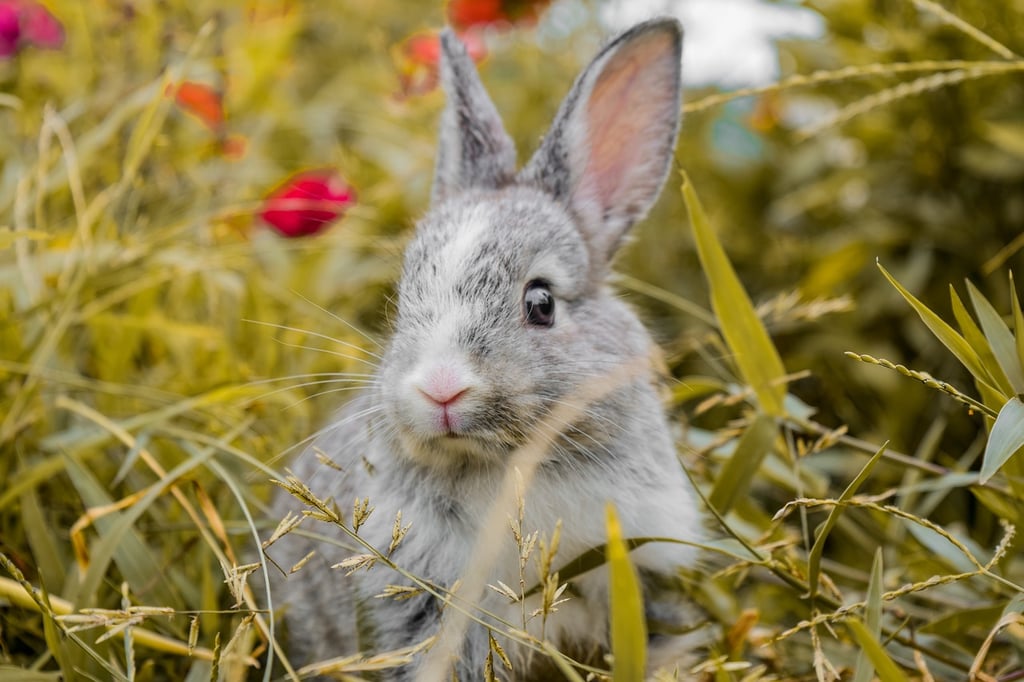
Factors Influencing Rabbit's Feeding Behavior
Rabbits are herbivores, meaning their diet primarily consists of plant material. However, their specific feeding behavior can be influenced by various factors. Understanding these factors is essential in comprehending why rabbits may or may not eat geraniums.
1. Availability of Food:
Rabbits are opportunistic feeders and will consume whatever vegetation is readily available to them. If there is a shortage of their preferred plants or if they are attracted to the scent or taste of geraniums, they may venture to eat them despite their deterrent qualities.
2. Nutritional Value:
Rabbits are instinctively drawn to plants that provide them with essential nutrients. Geraniums, although not a core part of their diet, may contain certain elements that rabbits find appealing and seek out for their nutritional needs.
3. Seasonal Variations:
The dietary preferences of rabbits can shift with changing seasons. During times when their usual food sources are scarce, they may explore alternative plants, including geraniums, for sustenance.
4. Prey-Predator Relationships:
Rabbits are prey animals and have evolved to be extremely cautious and adaptive in their feeding behavior. They may avoid consuming certain plants if they associate them with potential dangers or predators, while showing interest in others that provide cover or camouflage.
5. Sensory Perception:
Rabbits have highly developed senses, particularly their sense of taste and smell. These senses play a significant role in determining which plants they choose to consume. Geraniums, with their distinct aroma, may either attract or repel rabbits, depending on their individual preferences and past experiences.
- Availability of Food
- Nutritional Value
- Seasonal Variations
- Prey-Predator Relationships
- Sensory Perception
By considering these factors, we can gain insights into why rabbits may occasionally eat geraniums or show indifference towards them. Implementing strategies that address these influences can help minimize the likelihood of rabbit damage to your precious geraniums.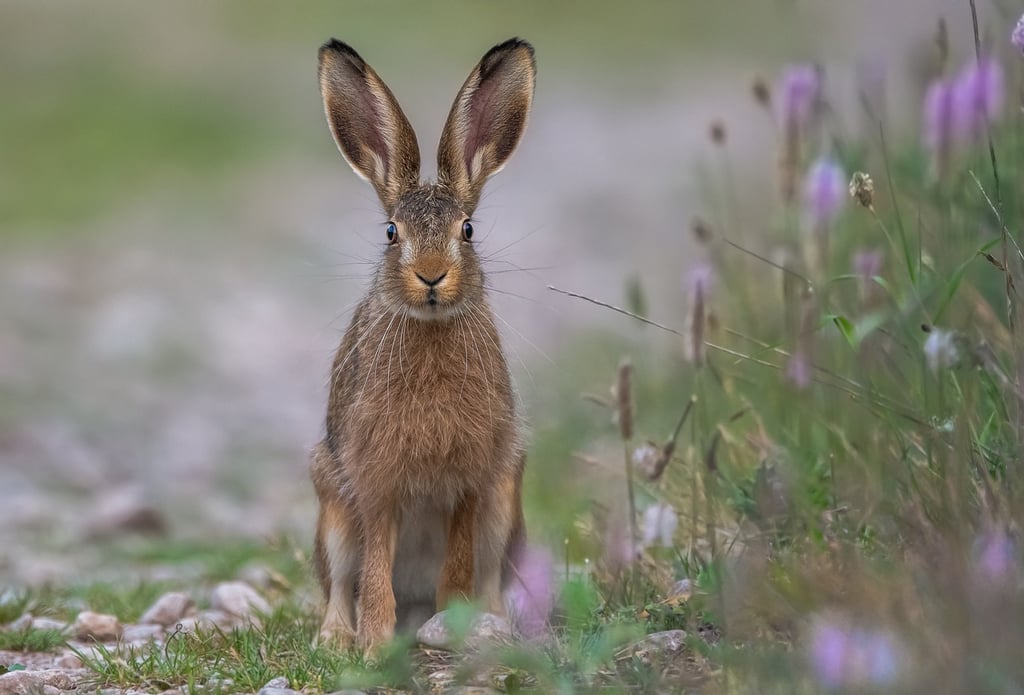
Methods to Prevent Rabbits from Feeding on Geraniums
Preventing rabbits from feasting on your geraniums requires a combination of proactive measures and strategic planning. Here are some effective methods you can employ:
- Physical Barriers: Installing physical barriers around your geraniums is one of the most effective ways to keep rabbits at bay. Use materials like chicken wire, fencing, or mesh to create a barrier around your plants. Make sure the barrier extends at least one foot underground to prevent rabbits from digging underneath it. Additionally, ensure that the barrier is tall enough to stop them from jumping over it.
- Natural Deterrents: Rabbits have a strong sense of smell, and certain scents can be repulsive to them. Planting strong-smelling herbs and flowers around your geraniums can help deter rabbits. Plants such as garlic, marigold, and lavender are known to repel these furry garden invaders.
- Repellents: Commercial repellents can also be effective in keeping rabbits away from your geraniums. Look for rabbit-specific repellents that contain ingredients like hot pepper, garlic oil, or predator urine. Apply these repellents according to the instructions on the package, typically reapplying after rain or every few weeks.
- Scare Tactics: Scaring rabbits away from your geraniums can be an effective short-term solution. Place scare devices such as rubber snakes, motion-activated sprinklers, or windchimes near your plants to startle the rabbits and discourage them from coming back. Keep in mind that rabbits may eventually get accustomed to these scare tactics, so it's best to combine them with other methods.
- Companion Planting: Some plants are known to repel rabbits when grown alongside vulnerable plants like geraniums. Consider planting rabbit-resistant varieties such as daffodils, catnip, or sage near your geraniums to create a natural barrier. When rabbits encounter these plants, they may be deterred and choose to munch on other greens instead.
Remember, it's important to regularly inspect your geraniums for any signs of rabbit damage. If you notice nibbled leaves or stems, take immediate action to reinforce your prevention methods or try alternative strategies. By employing a combination of physical barriers, natural deterrents, repellents, scare tactics, and companion planting, you can significantly reduce the chances of rabbits feeding on your beloved geraniums.
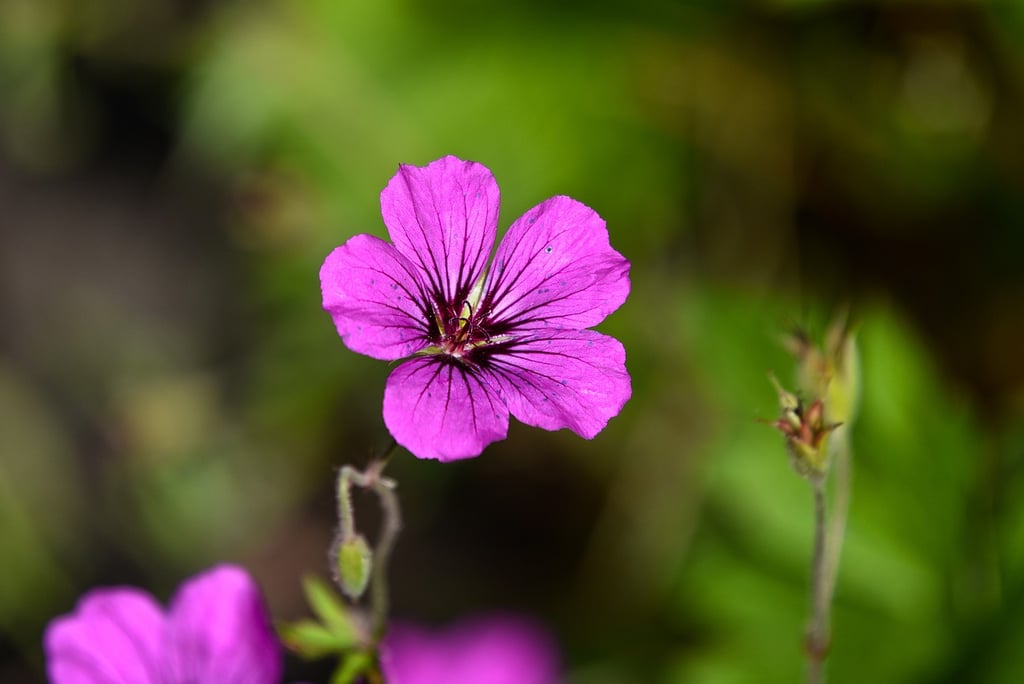
The Role of Repellents and Barriers
When it comes to protecting your geraniums from rabbit damage, repellents and barriers play a vital role. These methods are effective in creating a deterrent for rabbits, preventing them from accessing and feeding on your beloved plants. There are various types of repellents and barriers available, each with its advantages and disadvantages.
One common type of repellent is a chemical-based spray that emits an odor that rabbits find unpleasant. These sprays are designed to be safe for plants but repulsive to rabbits, effectively keeping them away. It is important to choose a repellent that is specifically formulated for rabbits to ensure its effectiveness.
Another type of repellent is a taste deterrent. These are substances that, when applied to the plants, make them taste unpleasant to rabbits. This discourages rabbits from feeding on the geraniums. Taste deterrents are non-toxic to plants and animals, making them a safe and eco-friendly choice.
In addition to repellents, physical barriers can also be highly effective in keeping rabbits away from your geraniums. One popular option is fencing. A rabbit-proof fence should be at least two feet tall and buried into the ground by a few inches to prevent rabbits from digging underneath. The mesh size of the fence should be small enough to prevent rabbits from squeezing through. Regular inspection and maintenance of the fence are necessary to ensure its integrity.
If fencing is not feasible, individual plant protection can be achieved by using wire cages or cloches. These are enclosures that are placed around the geraniums, creating a physical barrier that rabbits cannot access. Wire cages can be homemade or commercially available in various sizes and shapes to accommodate different plant sizes.
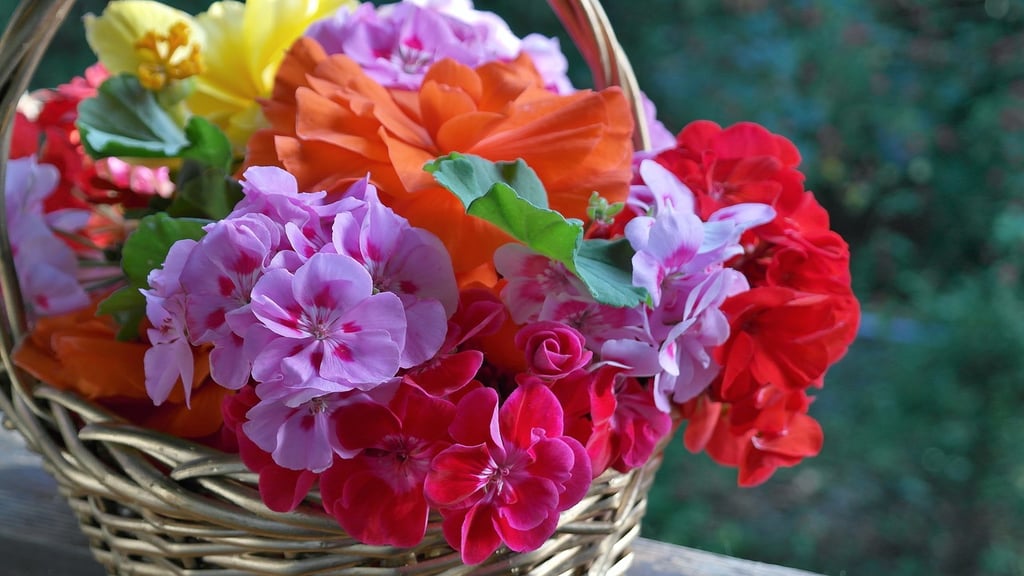
Alternative Plant Options for Rabbit-Proof Gardening
When it comes to protecting your garden from rabbits, one effective approach is to choose alternative plants that are less appealing to these furry culprits. By selecting rabbit-resistant plants, you can create a beautiful garden that is less likely to be devoured by these herbivores. Here are some plant options that you can consider:
- Pungent Herbs: Rabbits are generally repelled by strong scents, so planting pungent herbs like rosemary, sage, and thyme can help deter them from your garden. These herbs not only add a delightful aroma to your garden but can also be used in your culinary endeavors.
- Strongly Scented Flowers: Certain flowers with strong scents can serve as a natural deterrent for rabbits. Plants like marigolds, lavender, and snapdragons have fragrances that rabbits find unpleasant and tend to avoid. Adding these flowers to your garden not only adds visual appeal but also helps keep rabbits at bay.
- Spiky or Prickly Plants: Rabbits are not fond of plants with thorns, prickles, or spiky leaves. Consider incorporating plants like cacti, yuccas, or spiky ornamental grasses into your garden design. These plants act as natural barriers and make it less appealing for rabbits to hop in and indulge in their feeding frenzy.
- Native Plants: Opting for native plants in your garden can be beneficial in many ways. Native plants have adapted to the local environment and are often less palatable to rabbits. They also attract native insects and wildlife that can help maintain ecological balance. Check with local nurseries or garden centers for a list of rabbit-resistant native plants suitable for your region.
When planning your garden, it is important to remember that no plant is completely rabbit-proof. While rabbits may be deterred by certain plants, hungry rabbits can still cause damage if food sources are scarce. To further protect your garden, it is recommended to combine alternative plant options with other preventive measures such as repellents and barriers. Creating a diverse, rabbit-resistant garden will not only help safeguard your plants but will also enhance the overall beauty and ecological value of your outdoor space.
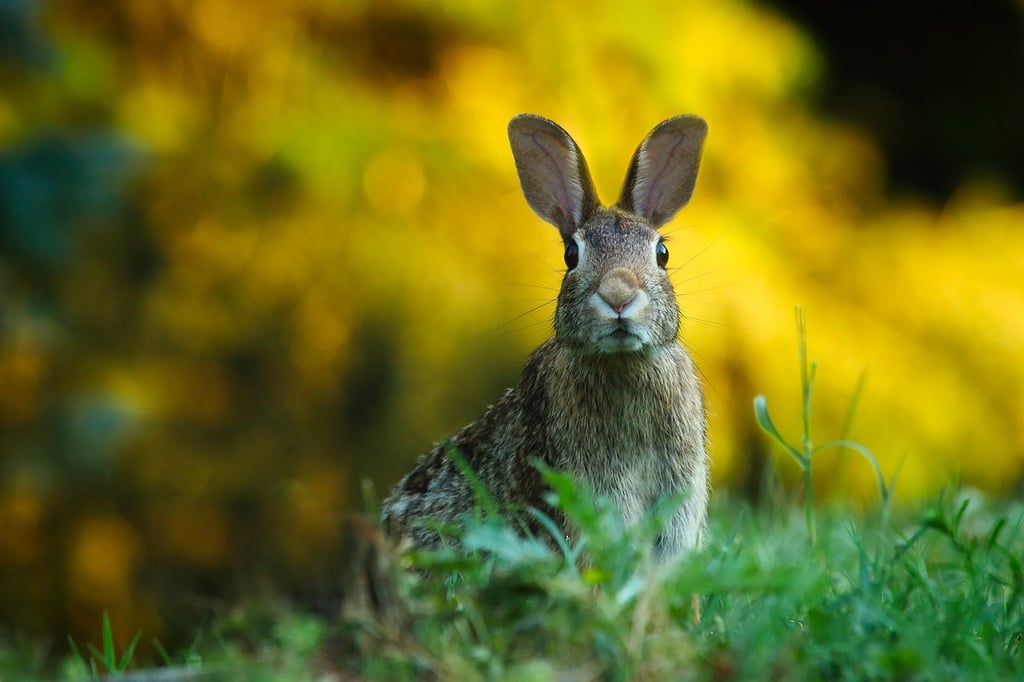
Educating the Public about Rabbit Feeding Habits
Educating the public about rabbit feeding habits is crucial for promoting understanding and preventing unnecessary harm to rabbits and their habitats. Many people have misconceptions about rabbits' dietary preferences, which can lead to severe consequences for both the rabbits and the ecosystem they inhabit. By spreading accurate information and fostering a sense of empathy towards these adorable creatures, we can create a harmonious coexistence between humans and rabbits.
First and foremost, it is essential to highlight that rabbits are herbivores. Their diet mainly consists of various plants, grasses, and leafy greens. Contrary to popular belief, rabbits do not exclusively feed on geraniums or other specific plants. They have a diverse palate and consume a wide range of plant species to meet their nutritional needs.
One way to educate the public about rabbit feeding habits is by sharing resources such as brochures, pamphlets, or online articles that provide accurate and reliable information. These resources should include details about the diverse diet of rabbits and emphasize the importance of maintaining a balanced ecosystem that supports the natural feeding habits of these animals.
- To dispel misconceptions, it is crucial to address common myths surrounding rabbit feeding habits. For example, many people believe that rabbits only eat carrots, thanks to popular culture references. In reality, carrots should only be given as occasional treats and not constitute the majority of a rabbit's diet.
- Additionally, educating the public about the impact of feeding domesticated rabbits the wrong foods can help prevent health issues. Rabbits have sensitive digestive systems, and a diet high in sugar or improper supplementation can lead to obesity, dental problems, and gastrointestinal disorders. By providing guidance on appropriate rabbit diets, we can ensure the well-being of both domesticated and wild rabbits.
- It is also vital to educate the public about the adverse effects of human intervention in altering rabbit feeding habits. For example, dumping excess food waste in areas where wild rabbits reside can lead to imbalances in their natural diet, decreasing their ability to find and consume the appropriate plant species necessary for their health.
In conclusion, while rabbits may have a reputation for being voracious eaters, the myth that they consume geraniums is not entirely accurate. While there are instances where rabbits may snack on geraniums, they typically prefer other plants. Understanding the rabbit diet, the allure of geraniums for rabbits, and the factors influencing their feeding behavior is crucial for implementing effective prevention methods. By utilizing repellents, barriers, and alternative plant options, it is possible to protect your geraniums from rabbit damage. Furthermore, educating the public about rabbit feeding habits can help dispel misconceptions and promote coexistence between rabbits and gardeners. So, next time you see a cute bunny hopping by your flower bed, you can rest assured knowing that your beloved geraniums are safe from its appetite.

